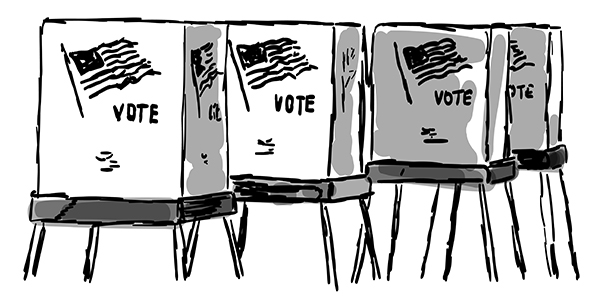There is no primary candidate in the 2020 primaries
October 25, 2019
Trying to follow along with politics doesn’t mean we know what we’re doing.
Listen, I’m sure that Democrats have the primary all figured out with their candidate assured to win with a clean track record and excellent policy platform.
Now all that’s left is figuring out how to deal with the garbage that is the Electoral College, and 2020 will be a no-brainer.
I’ve been a political science major since I got to UVM two years ago, and I like to consider myself politically informed.But in all honesty I’ve had a hard time keeping up with the primary.
The issue I have is whether I should support the candidate I think is best, or whether I should go for the candidate others think are best, thereby increasing popular support for that candidate.
I want to trust my own interests and judgement in how I want to vote, but it seems rational to assume that other people know more than I do and are thus better informed in their selection.
After nearly eight months of campaigning, it’s very difficult to be equally informed on all the Democratic candidates. There are currently 19 candidates, according to a Sept. 20 New York Times article.
This high number makes me think people are just supporting their preferred candidate, which isn’t necessarily a bad thing.
Having a preferred candidate usually means you follow politics to some extent and your candidate has traits and policies that appeal to you and your peers.
But at some point, I’d argue you have to consider how far your interests really go.
The Republican Party has been successful in modifying personal interests in favor of keeping the conservative base together.
Sure, some conservatives have been openly critical of the president, but overall President Donald Trump has had one of the most stable approval ratings, 40%, of any recent president, according to an Oct. 20 FiveThirtyEight poll.
Ironically, Trump’s primary victory was probably the closest he’s come to fulfilling the ideals of democracy.
Voters vocalized their support, despite him not being a favorite of the party establishment. After he won, Republicans stuck with him through the general election.
This is what Democrats contend with. No matter which candidate they choose as the frontrunner, that 40% of voters who approve of Trump will side with him again, according to the same FiveThirtyEight poll.
I know that with our current problems, it feels like we need a strong president who will enact climate change policy and reduce firearm violence, regardless of which party controls Congress or the courts.
We all want the immediate change that will solve our problems, but that simply doesn’t work with the support of only one party. Trying to force action by bending the rules is dangerous.
Precedent is crucial for our country. I think we often forget how frustrating it was for former President Barack Obama to have his plans stopped by Congress, only to wish that anyone would restrict Trump’s executive domination.
But that’s assuming the front runner will be a centrist. I’m optimistic about the success of Senator Bernie Sanders and Senator Elizabeth Warren on the campaign trail. Should they win, then I will preach the same message to more moderate voters.
Consider the bigger picture of your interests. Do you want to reduce economic inequality and expand public goods, or do you just hate criminals and immigrants?
I know it sucks to hear people preach about unity and “doing it because the alternative is worse,” but that just comes with living in a democracy.
So I guess what I’m saying is, former Vice President Joe Biden for president 2020.
Nah, just kidding. That would be ridiculous.








Susan Anthony • Oct 26, 2019 at 12:20 pm
Vermont has enacted the National Popular Vote bill. It is 73% of the way to guaranteeing the majority of Electoral College votes and the presidency to the candidate who receives the most popular votes in the country, by changing state winner-take-all laws (not mentioned in the U.S. Constitution, but later enacted by 48 states), without changing anything in the Constitution, using the built-in method that the Constitution provides for states to make changes.
It requires enacting states with 270 electoral votes to award their electoral votes to the winner of the most national popular votes.
All voters would be valued equally in presidential elections, no matter where they live.